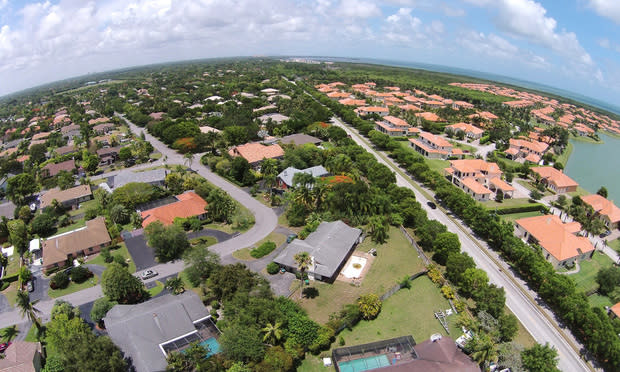Homes Slipping Beyond Grasp of Buyers Across US as Rates Rise

Suburban real estate in Miami, Florida. Photo: Google
This is how housing markets turn. Slowly.
Six years of home-price gains outpacing wage growth; bidding wars replaced by sales at the asking price; days or weeks on the market turning into months; rising mortgage rates. First-time shoppers start to get priced out, making it harder for move-up buyers to sell, and the slowdown ripples gradually up the real estate food chain.
“Every single market in the country has an entry-level problem,” said Candace Adams, who oversees Berkshire Hathaway HomeServices’ operations and agents across Connecticut, Massachusetts, New York and Rhode Island.
While U.S. home prices have gained almost 60 percent since March 31, 2012, according to the S&P Corelogic Case-Shiller 20-City Composite Index, household income is up a little less than 30 percent in the same period, Bureau of Economic Analysis data shows. The average rate for a 30-year fixed mortgage rose from about 3.85 percent at the start of 2018 to about 4.74 percent now, Bankrate.com reports. Next year, it’s expected to rise further.
A buyer with a $2,500 monthly housing budget has lost almost $30,000 in purchasing power this year, according to Redfin Inc., a national brokerage.
In Orange County, California, more than 30 percent of homes for sale in the metro area would become unaffordable to buyers with a $3,500 monthly budget, Redfin estimates. In San Jose, that number would be almost 40 percent.
A half-point increase on a mortgage means cutting the price by about $25,000 and the size of the house by as much as 200 square feet. In cities where prices have gained the most, an increase of as little as half a percentage point in the borrowing rate can be the difference between buying and continuing to rent.
Miami prices are up almost 70 percent since March 2012, according to Corelogic Case-Shiller and many buyers are getting worried about interest rates, said Liz Hogan, a realtor at Compass. She has a client looking at a house in Pinecrest, Florida listed at $899,000. The seller has been out of town, delaying the deal, and the client is getting antsy, she said.
“His thing to me every day is, ‘I’ll be patient, but not that patient because my mortgage broker told me the rates are going up and if they go up any more I’m not going to be able to afford this house,’’’ Hogan said. “He’s petrified he’s going to get priced out.’’
Entry-Level Buyers
Higher rates have the biggest impact on entry-level buyers, said Kim O’Connor, an agent at 8z Real Estate in Denver.
“I have really sharp millennial clients who were first-time home buyers in the late Spring and definitely interest rates were on their minds the whole time,’’ O’Connor said. They were in a hurry to buy before another rate hike.
But interest rates are only part of the story. Areas with high taxes, like Chicago, New York and New Jersey, have been affected by last year’s tax bill, which capped the amount of state taxes and mortgage interest that could be written off on federal returns.
Buyers from high-tax states are coming to Florida, which has no state income tax, Hogan said. She cited two recent clients — one from the New York area and one from Greenwich, Connecticut — who are house shopping in South Florida to establish residence there, even as they continue working in New York.
The biggest home-price gains in the country have been in cities where demand is tied to the stock performance of the biggest employers.
“In metros like San Jose, San Francisco, Seattle, where wages are more closely tied to how tech stocks are doing, we’ve seen that’s where prices have gone up the most,” said Daryl Fairweather, chief economist at Redfin.
Amazon Returns
Shares of Seattle-based Amazon.com returned more than 900 percent from the first quarter of 2012 until Sept. 4, 2018, and housing prices in the city have almost doubled, according to Case-Shiller. The company’s shares have dropped about 20 percent since the beginning of September and that’s already being reflected in the housing market.
“There’s been a lot of money in Seattle going into housing but over the last couple month the Amazon stock price has gone down, so if that continues, that would have a negative impact on the Seattle housing market,” said Fairweather. “This could be a temporary dip or it could be longer term. It’s kind of like their piggy bank.”
There’s a chance that Seattle prices could start to decline next year, especially as higher mortgage rates curb demand, Fairweather said.
Seattle properties are staying on the market longer, and selling for the asking price, even as inventory remains low, said Sol Villarreal, an agent with Windermere Real Estate Co., who largely works with first-time home buyers in the city.
“Just knowing that the list price is what you can actually buy the house for, that’s a big shift,” said Villarreal. “List prices are still very much in sellers’ favor and still going up at a meaningful rate. It’s just removing that uncertainty of the multiple offer market” for buyers.
Seattle, Denver and Baltimore are seeing price growth slow by the quarter, said Skylar Olsen, director of economic research and outreach for Zillow Group Inc.
“In many ways, we’re so used to things moving so fast that we forget that housing markets are supposed to be stable,’’ Olsen said. “These are long-term financial decisions. They should move more slowly.”
Justina Vasquez reports for Bloomberg News.



